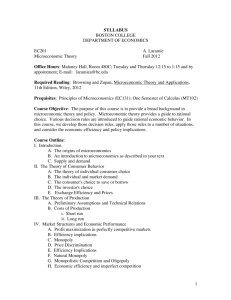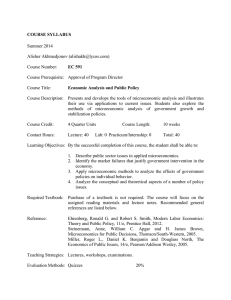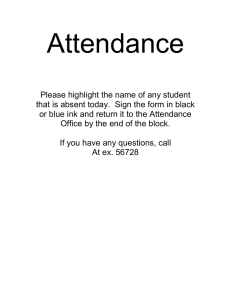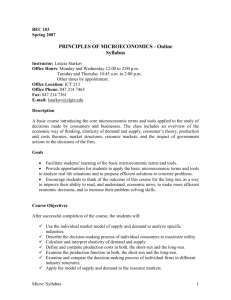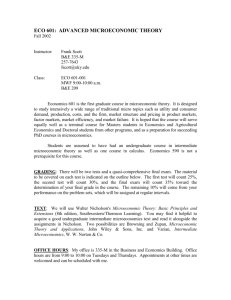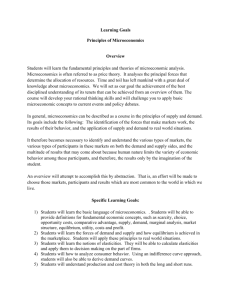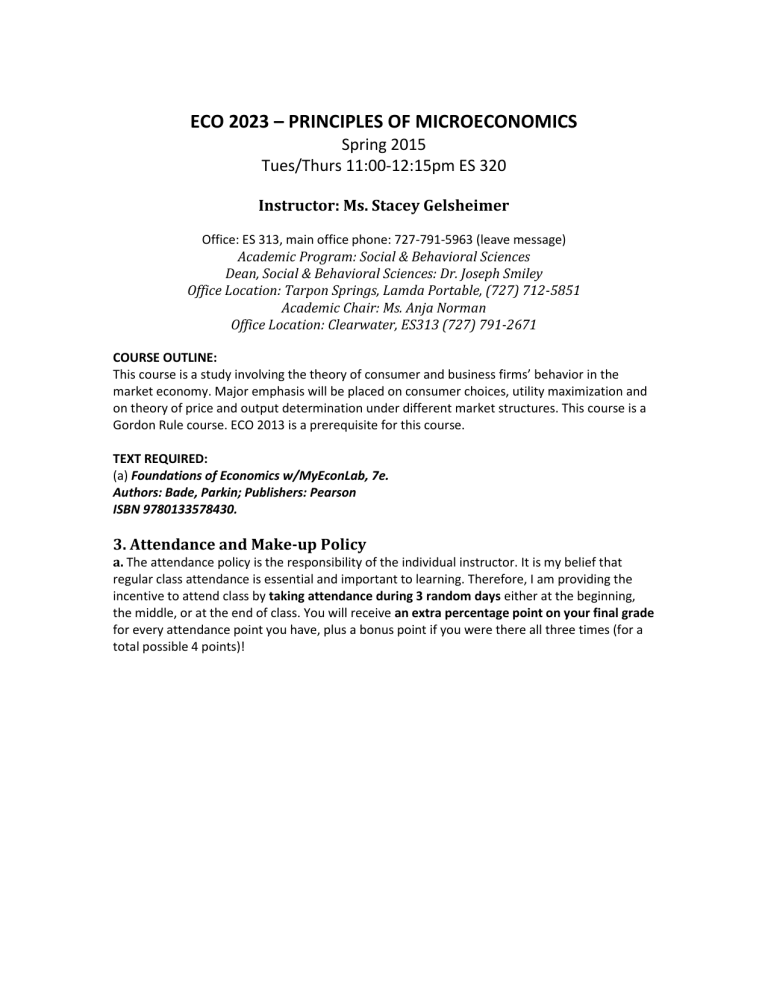
ECO 2023 – PRINCIPLES OF MICROECONOMICS Spring 2015 Tues/Thurs 11:00-12:15pm ES 320 Instructor: Ms. Stacey Gelsheimer Office: ES 313, main office phone: 727-791-5963 (leave message) Academic Program: Social & Behavioral Sciences Dean, Social & Behavioral Sciences: Dr. Joseph Smiley Office Location: Tarpon Springs, Lamda Portable, (727) 712-5851 Academic Chair: Ms. Anja Norman Office Location: Clearwater, ES313 (727) 791-2671 COURSE OUTLINE: This course is a study involving the theory of consumer and business firms’ behavior in the market economy. Major emphasis will be placed on consumer choices, utility maximization and on theory of price and output determination under different market structures. This course is a Gordon Rule course. ECO 2013 is a prerequisite for this course. TEXT REQUIRED: (a) Foundations of Economics w/MyEconLab, 7e. Authors: Bade, Parkin; Publishers: Pearson ISBN 9780133578430. 3. Attendance and Make-up Policy a. The attendance policy is the responsibility of the individual instructor. It is my belief that regular class attendance is essential and important to learning. Therefore, I am providing the incentive to attend class by taking attendance during 3 random days either at the beginning, the middle, or at the end of class. You will receive an extra percentage point on your final grade for every attendance point you have, plus a bonus point if you were there all three times (for a total possible 4 points)! At the 60% point of the semester (once 60% of the semester has passed), I am required to report “active participation” for each student. If your status is less than satisfactory, you will be placed on academic hold and will not be allowed to register for classes without a “success plan” initiated through the college. b. If you stop attending class, this will not prevent the awarding of a final grade. THE LAST DAY TO WITHDRAW WITH A GRADE OF “W” IS 03/25/2014. c. Make-up tests and examinations may be permitted, provided there is an acceptable reason, and the absence has been excused by the instructor. Make-ups must be taken on your first day returning to class. No student will be permitted to take more than one make-up test during the session, under any circumstances. You MUST arrange make-ups BEFORE the missed exam. Emailing me after the exam has taken place will cause you to lose your privilege to make it up. 4. Grading and Examinations a. Grading Scale is as follows: (notice the rounding is already factored in) 89.45 - 100 = A 79.45 - 89.44 = B 69.45 - 79.44 = C 59.45 -.44 = D 59.44 & Below = F b. Tests (60% of final grade) will be announced, usually a week in advance. There will be 3 noncomprehensive exams given throughout the semester. c. Homework Assignments: (20%) There will be homework assignments in MyEconLab given. The student will have one week to complete the assignment online. Once the due date has passed there will be no opportunity to make up the assignment and a grade of zero will be given for that particular assignment. Your lowest TWO homework grades will be dropped. d. Writing Requirement: (20%) Since this class is a Gordon Rule course, writing assignments will be given toward the middle of the semester in order to fulfill the 2000-word writing requirement. Details will follow. THE COMPREHENSIVE FINAL EXAM WILL BE OPTIONAL. IT CANNOT HURT YOUR FINAL GRADE, BUT IT MAY BRING IT UP BY REPLACING ANY AND ALL LOWER PREVIOUS EXAM SCORES! Teaching Philosophy: I am here to TEACH you, not to TRICK you. I believe in providing the tools necessary for successful learning, including extensive reviews of the material, "practice" problems, and interactive questions & answers. You should not be "surprised" by any question that I present to you during testing time! If you are, you didn't attend class enough... 5. Special Accommodations: If you wish to receive special accommodations as a student with a documented disability, please make an appointment with the Learning Specialist, SS 104, 791-2710. If you have a documented hearing loss, please contact the Program for the Deaf/Hard of Hearing, SS 101, 7912628 (V/TDD). If you will need assistance during an emergency classroom evacuation, please contact your campus Learning Specialist immediately about arrangements for your safety. The telephone numbers for the Office of Services for Students with Disabilities are791-2628 or 7912710. 6. Academic Honesty: Cheating, plagiarism, bribery, misrepresentation, conspiracy and fabrication are defined in Rule: GHx23-4.361, Student Affairs: Academic Honesty Guidelines, Classroom Behavior. The policy can be found at: http://www.spcollege.edu/webcentral/admit/honesty.htm READING AND TOPICS: Students are responsible for all assigned readings. Chapter 4: Demand and Supply Chapter 5: Elasticities of Demand and Supply Chapter 6: Efficiency and Fairness of Markets Chapter 7: Government Actions in Markets Chapter 13: Consumer Choice and Demand Chapter 14: Production and Cost Chapter 15: Perfect Competition Chapter 16: Monopoly Chapter 17: Monopolistic Competition Chapter 18: Oligopoly Major Learning Outcomes: 1. The student will acquire knowledge of the basic tools needed to understand current microeconomic theory. 2. The student will develop an understanding of the basic theories involved in the study of microeconomics. 3. The student will develop an understanding of the operation of the market economy. 4. The student will acquire knowledge of the different market classifications used in analyzing the product and resource markets. 5. The student will develop an understanding of price and output determination in the product markets. 6. The student will develop an understanding of price and employment determination in the resource markets. 7. The student will develop an understanding of the effects of international trade and finance on employment, prices and incomes. 8. The student will acquire understanding of the characteristics of competing economic systems: socialism and communism. 9. The student will develop skills needed to apply basic microeconomic principles. 10. The student will develop an understanding of personal financial planning. Course Objectives Stated in Performance Terms: The course objectives stated in performance terms should answer the following questions: A. What will the student be held accountable for knowing and/or being able to do when this objective is accomplished? (This may include a sub-list of specific tasks if these are necessary or helpful in defining what a student should be able to do.) B. What criteria will be used to measure the student’s mastery of knowledge and/or skill when this objective is accomplished? C. What level of performance will be acceptable evidence of satisfactory achievement when the student is evaluated? 1. The student will acquire knowledge of the basic tools needed to understand microeconomic theory. Each student will demonstrate this knowledge by his/her ability to: a. define economic terminology b. identify or recall mathematical formulas used to solve problems involving basic microeconomic principles c identify, illustrate, and interpret graphs d. recall basic math and algebra 2. The student will develop an understanding of the basic theories involved in the study of microeconomics. Each student will demonstrate this understanding by his/her ability to: a. illustrate economic principles graphically b. identify or explain theories 3. The student will develop an understanding of the operation of the market economy. Each student will demonstrate this understanding by his/her ability to: a. describe the relationship between demand and utility b. describe the relationship between supply and cost of production c. determine changes in equilibrium price and output under given market situations 4. The student will acquire knowledge of the different market classifications used in analyzing the product and resource markets. Each student will demonstrate this knowledge by his/her ability to: a. recall the characteristics of the different market models b. recognize differences between the different market models 5. The student will develop an understanding of price and output determination in the product markets. Each student will demonstrate this understanding by his/her ability to: a. calculate the most profitable level of output given certain revenue and cost information b. interpret graphically the most profitable level of output 6. The student will develop an understanding of price and employment determination in the resource markets. Each student will demonstrate this understanding by his/her ability to: a. calculate the most profitable level of employment given certain cost and revenue information b. interpret graphically the most profitable level of employment 7. The student will develop and understanding of the effects of international trade and finance on employment, prices and incomes. Each student will demonstrate this understanding by his/her ability to calculate or determine changes in these variables under given market situations. 8. The student will acquire understanding of the characteristics of competing economic systems: socialism and communism. Each student will demonstrate this understanding by his/her ability to describe differences in capitalism, socialism, and communism. 9. The student will develop skills needed to apply basic microeconomic principles as evidenced by his/her ability to predict the theoretical outcome of changes in various market situations. SYLLABUS ADDENDUM Go to or Click on the following link for the latest updated Syllabus Addendum: http://www.spcollege.edu/central/asa/addendum.htm
